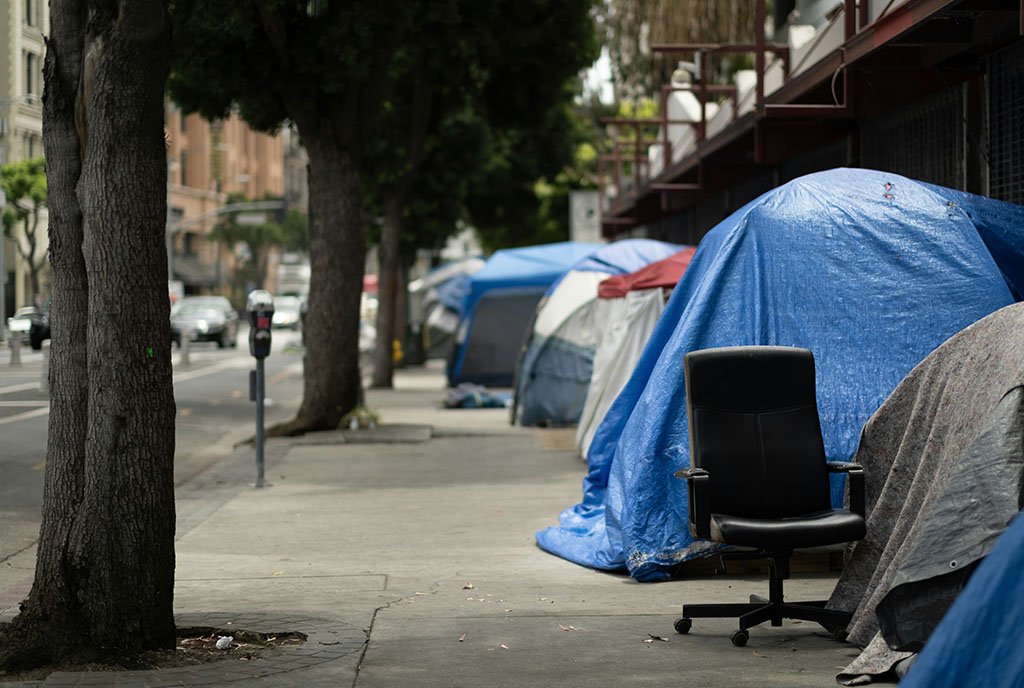
“I think the reality of life for poor and unhoused people is these folks are basically the canary in the coal mine of the rest of society, showing the way that we’re headed,” the Rev. Dr. Liz Theoharis, tells NPQ.
Theoharis is the executive director of the Kairos Center for Religions, Rights and Social Justice, which found that roughly 140 million or 43.3 percent of people in the United States were poor or low-income (earning between poverty-line income and twice that amount) in 2018. An article published in the Journal of the American Medical Association lists poverty as the nation’s fourth leading cause of death. And homelessness is rising.
A recent US Department of Housing and Urban Development (HUD) report identified 771,000 homeless people in January 2024, a record number that was 18 percent higher than the previous year, which in turn marked a 12 percent increase over 2022. The trend lines, in short, are headed in the wrong direction.
The need to organize and change these conditions is made evident by the June 2024 US Supreme Court decision in Grants Pass v. Johnson, which gave local governments license to fine, ticket, or arrest unhoused people.
The Journal of the American Medical Association lists poverty as the nation’s fourth leading cause of death.
“Homelessness is being criminalized,” observes Theoharis. “It’s being criminalized right at the moment when more and more people are being thrust into homelessness.”
A New Gilded Age
This is not the first time in history that homeless people have been criminalized in the United States. During the Gilded Age, in the late 1800s, homelessness was widespread in urban communities, and vagrancy laws made loitering, being poor, looking suspicious, wandering around, or being drunk a crime. Meanwhile, public policy failed to address the economic drivers of poverty.
The nation’s modern era of homelessness similarly has economic and policy drivers. These range from a reduction in available affordable housing (such as the demise of single-room occupancy units), the deinstitutionalization of the mentally ill, the HIV/AIDs pandemic, and deep HUD budget cuts in the 1980s. Just like a century before, the criminalization of poor and homeless people has occurred alongside civil rights rollbacks.
Discussions of homelessness often deny homeless people agency, but there is a history of organizing in these communities, including the work of the National Union of the Homeless (NUH) in the late 1980s and early 1990s.
Theoharis is among this group. “The Kairos Center and the core of leaders that helped to found it and are still helping to build it, including myself, comes out of a genealogy of poor people and unhoused people organizing back to the National Union of the Homeless and the National Welfare Rights Organization,” she says.
A Moral Crisis
For the past 20 years, the Kairos Center has been part of a network of grassroots organizing led by the poor to end all poverty as they seek to bridge religious leaders and poor people across racial lines.
Discussions of homelessness often deny homeless people agency, but there is a history of organizing in these communities.
“A lot of what Kairos has done over the years,” Theoharis explains, “has been to build the network and capacity of grassroots leaders making a difference for themselves and their communities while at the same time shifting the narrative in the country about who is poor and why people are poor.”
Sign up for our free newsletters
Subscribe to NPQ's newsletters to have our top stories delivered directly to your inbox.
By signing up, you agree to our privacy policy and terms of use, and to receive messages from NPQ and our partners.
The center also co-anchors the Poor People’s Campaign (PPC): A National Call for Moral Revival, a movement started by Dr. Martin Luther King Jr. in late 1967 with the Southern Christian Leadership Conference (SCLC), which advocated for a “revolution of values.” The renewed PPC has put forth a Third Reconstruction Agenda that seeks to build support for civil rights as a path toward healing. Over the past several years they have organized with 400 partner organizations, including labor unions and religious groups in over 40 states with the goal of reaching over 50 million people nationally.
Theoharis emphasizes the campaign’s reference to moral revival: “We live in an incredibly wealthy country where we have at least five abandoned houses for every unhoused person and where we throw away more food than it takes to feed everybody. When you have the material capacity to end homelessness tomorrow, and yet you have policies and laws in place that are impoverishing close to half of the population, and millions of people who have no roof over their head, this is a moral crisis.”
The Unhoused Are Organizing
PPC’s organizing and its call for a third reconstruction rooted in a moral revival aim to center discussion of poverty and homelessness and make it an urgent matter. Ultimately, however, it is unhoused people in pockets of the country who are standing up and organizing.
“In many cases, people are being compelled themselves because of their living situations to organize. It’s a different kind of organizing and activism,” Theoharis explains. “People become activists and become leaders not because they were seeking to do that, but because they have to for their very survival.”
Theoharis cited a number of examples, including the Lancaster County Homeless Union in Lancaster, PA; efforts by unhoused people in Los Angeles to resist evictions from encampments; and unhoused people in Elmira, NY protesting against the removal of their tent homes this past winter.
“I think one of the things that’s been very important in organizing amongst unhoused and homeless people and dispossessed people throughout our history is actually recognizing the self-organization that unhoused people are doing,” she says. “In many places there may not be an organization or even a homeless union that’s organizing, but there are unhoused folk that are responding to attacks on unhoused people.”
Organizing has moved the needle in some ways, which was particularly evident during the COVID-19 pandemic, when unhoused people gained access to washing stations and vouchers for hotels. Housing justice organizers also won a national moratorium on evictions as local groups such as the Los Angeles Tenants’ Union organized rent strikes.
“When poor and low-income people…organize, we can show that deep transformation is possible.”
Organizing in the Era of Grants Pass
The Grants Pass decision has been a setback. However, Theoharis as points out, “It doesn’t mean that people aren’t resisting and organizing and protesting and getting themselves between law enforcement and other unhoused people.”
The Supreme Court’s ruling, Theoharis notes, is a product of “the past decade of real pathologizing and almost villainizing of unhoused people,” but organizing is where people can counter dehumanization.
“I think when poor and low-income people—when unhoused folk—organize, we can show that deep transformation is possible. It’s usually the most successful when folks have little or nothing to lose.”
While times are hard, Theoharis insists there are “huge rays of hope coming from poor folk that refuse to give in.” She adds, “I get to travel around the country, seeing many places that are deeply poor, and I have hope that something better is possible and on the verge of becoming the reality for everybody.”












